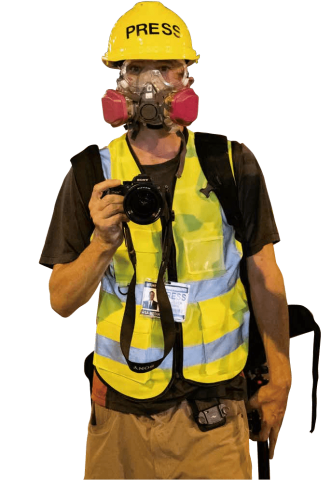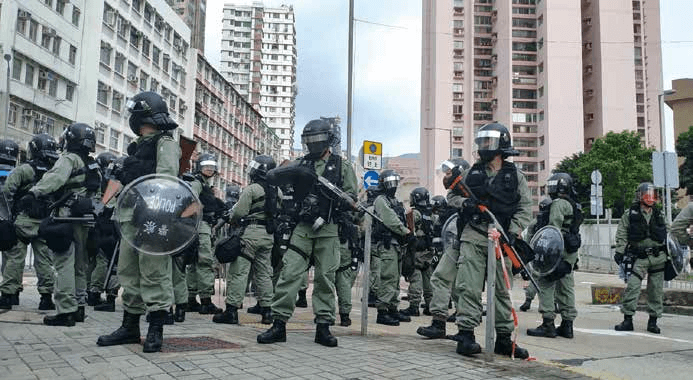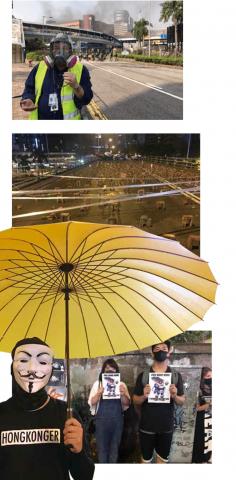Issue:
Turmoil on the streets of Hong Kong
While traditional media covering the protests is suffering from shrinking pocketbooks and fewer reporters, freelancers using new techniques and support groups are taking up the slack.
By Pio d’Emilia
“I would say my worst experience was when I was tear-gassed by police in the face. The burning sensations lasted many hours. The uncertainty of not knowing what could happen next also was a big psychological factor. Events and information flood in from all over the city and it is hard to gauge, especially when you can’t afford a local fixer. You know something is horribly wrong with society when you feel safe among the protestors but fear the police.”
— Sean Fleck, 50, “stock footage and filmmaker”

Freelance journalist Sean Fleck covered up and marked out as a journalist
photo by AIDEN ANDERSON
Sean Fleck, who hails from Desert Hot Springs, California, is one of the hundreds of foreign reporters, mainly freelancers, who have been constantly covering the HK crisis over the last months. It is thanks to him and his colleagues, rather than the mainstream media and big networks, that the world has been kept regularly informed about what is going on in the once peaceful, rich, and fascinating “fragrant harbor.”
Journalists are not required to mention their profession or purpose of visit on their Hong Kong arrival cards. Journalists on a temporary assignment or even those without a proper visa don’t have to lie or be afraid of being found out, as in many other countries. Even during these difficult and politically tense days, most foreign nationals get a three month visa, and can find themselves quickly on the road, free to report.
While it definitely is part of China, the “one country two systems” still works most of the time, at least as far as freedom of the press is concerned. Beside a few, some very serious, cases of harassment and blatant violations of the rules (widely reported and denounced even on the local media), Hong Kong is still heaven to report from compared to many other places. “We don’t know how long this is going to last,” says Tom Grundy, founder and Editor in Chief of Hong Kong Free Press. “But we will certainly fight to keep it going as long as we can. HKFP is a very active “run by journalists and backed by readers” non-profit, online news source, which specializes in front line reporting.
THERE IS NO WAY to check just how many journalists there actually are. Some people say a few hundred, some say more than a thousand. Many come and go, like myself.

For months, Hong Kong has been torn apart by antigovernment protests, at times some very violent ones. The police force has become increasingly violent and reckless, something, to be honest, that we are used to witnessing in other countries. (Mine included; remember what the police did during the 2001 G-8 in Genoa?) But this sort of thing was never seen before in Hong Kong. Now protesters, along with doctors, first aid volunteers, social workers and many journalists are being beaten, tear gassed, pepper sprayed and arrested. Some were clearly and directly targeted.
One day, I was coming out of the Hong Kong Polytechnic University campus in in Tsim Sha Tsui, which after being occupied by the protesters, had been sealed off and literally put under siege by the police. It was on Monday, Nov. 18, after a violent, but unsuccessful attempt to “clean” it up. I saw with my own eyes fellow journalists (mainly local), who were wearing yellow “press” jackets and had their hands raised, being grabbed and dragged into police vans. None of the police attempted to identify them or ask for their credentials. A few of us foreign journalists even took photos and video of this shameful behavior. They let us go, but I was really worried. In fact, I’ll confess, I was scared. In this splendid, but now deeply wounded and divided city of more than 7 million that is struggling to preserve and defend its “system,” the job of journalism has become increasingly difficult and dangerous. All the more so for those among us an ever increasing number who are not full time employees of big media, and cannot afford fixers, translators, or insurance; those who don’t have official assignment letters and have to keep expenses as tight as possible. I am talking about the hundreds of young and old, generous, motivated, brave colleagues who keep us informed about the situation in HK beyond the usually short, very episodic “breaking news” reports on the big networks.
FOR YEARS I WAS a freelancer, so I feel lots of sympathy and respect for these people. I’ve watched them in action on the “battlefields” of Hong Kong, constantly on the front line, trying to get the best shot. But they also are always helping each other, in a kind of group solidarity which is increasingly hard to find among mainstream media journalists.
I believe they deserve our gratitude. They are the ones who are risking their lives to get as close as possible to the action, to get the best shot and then spend time to edit, select and send it out in the hope that somebody will use it and pay for it. It’s something that no one does if they don’t love their job, if they’re not sincerely committed, if they don’t consider the job, no matter how dangerous and difficult, a duty and a privilege.
Being accurately and promptly informed is fundamental in this situation, where the apparently leaderless, multifaceted “movement” organizes all kind of actions at the very last minute. And just as the “movement” uses several more or less “open” chats on different platforms (mostly Telegram), journalists have set up their own network.
Some, like “Kwan Kung Temple” (https://t.me.kwan kungpress), have close to 10,000 members (once they register, very few bother to sign out) and is run by a group of local media in both Chinese and English. It is available on Telegram and has several different “subchannels.” Among those, “take an interview” or “looking for a fixer” are some of the most useful.
You can post a request for an interview, specifying the details and conditions and wait for an answer. Replies tend to come after a few minutes, directly to your Telegram account or via the forum. I have personally used this chat to interview a former policeman who resigned after he realized his son was a protest frontliner, and to meet several protesters who successfully escaped from the “occupied” PolyU. It is also a very efficient way to get updates on the actions of the day, press releases and links to local media and their livestreams.
WHERE DO YOU DRAW THE LINE? WHAT CAN YOU EXPECT FROM A COLLEAGUE, AND WHAT YOU SHOULD NOT EVEN ASK FOR?

Top to bottom: the author on the streets of Hong Kong; the “stonehenge” arrangement of bricks readied for throwing; Hong Kongers call for a “free Hong Kong”; a protester holding the symbol of the protests an umbrella
“Kwan Kung Temple” can be joined simply by sending a message to the above mentioned link; the on duty administrator will double check your identity and you are on.
ANOTHER CHAT GROUP THAT is particularly helpful is “solo journo support group.” This is on WhatsApp and is a little bit more complicated to join. But once you are in, you are really . . . in. The group was founded by Laurel, a local, brave and very competent journalist, and is open to all bona fide journalists and cameramen, after a double check of their identity. It is mainly an informal chat line for exchanging all kind of information. It is extremely useful for solo journalists who need updates on what is going on and where, in order to decide what to cover.
Before signing in, you are advised to go to Google Docs, search for “HK Protests 101 for Journalists,” and read it carefully. It is a precious, constantly updated and very detailed document which deals with all sorts of logistical, technical and legal information any journalist would need while covering the protests on their own. The sections titled “Front line Conduct & Police Precaution,” “Gear and Protective equipment,” and “preventive medical measures” are particularly useful, along with a very detailed segment covering what you should do in case of arrest, including hotline numbers and lawyer contacts.
Once you are member of this chat, you can count on literally hundreds of colleagues who share your job, your responsibilities and (hopefully) your values. Which bring us to a delicate issue of solidarity vs competition. Where do you draw the line? What can you expect from a colleague, and what you should not even ask for?
I’ll quote my friend from Desert Hot Spring, Sean Fleck: “That is a very good question. First and foremost, we are here to do a job, so basically everyone is looking to get the best shot or story. I feel that solidarity and cooperation are essential, and that if you act professionally and are curious you usually can get what you want. The last thing you want to be doing is fighting with other journalists because you never know when you may need help.”
I consider our job a privileged one. This is particularly true when somebody pays you a good salary and foots your expenses, like in my case. Unfortunately, the number of people with this kind of support is shrinking while the number of freelancers is increasing. So we owe them a lot. We should show them respect and gratitude. And pay them decently.
A list of helpful links for Hong Kong reporters can be found at the end of this article on the FCCJ webpage. www.fccj.or.jp/number-1-shimbun.html
Pio d’Emilia is the East Asia Correspondent for Italy’s Sky TG24.

